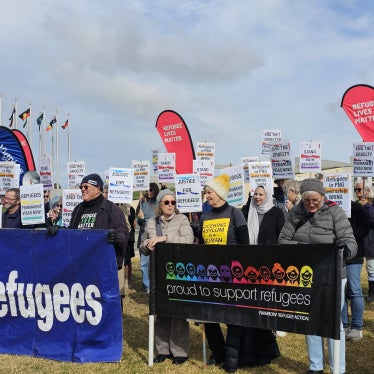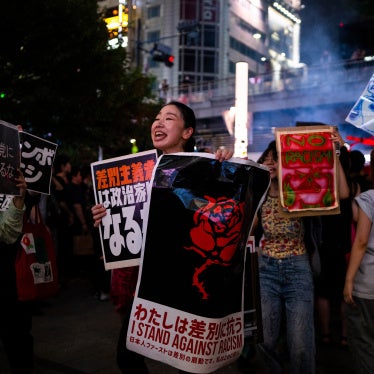Your Excellency,
In the light of developments in Afghanistan over the last few days, particularly in Kabul and Mazar-i Sharif, we believe that it is more important that ever to ensure that principles of international human rights and accountability are incorporated in security and governance arrangements for Afghanistan.
We also note the declaration of the "Six Plus Two" countries on November 12 to the effect that a future government should be a "broad based, multi-ethnic, politically balanced, freely chosen Afghan administration representative of [Afghan] aspirations and at peace with its neighbors. This administration must be able to meet the needs of the Afghan people and respect human rights, regional stability and Afghanistan's international obligations."
We would very much like to see the following five principles incorporated in any efforts to build a future government in Afghanistan:
1. Excluding Perpetrators of International Crimes from a Future Government
In the immediate future, we call upon you to emphasize that persons responsible for the most serious abuses of international human rights and humanitarian law must not be included in a new government for Afghanistan. Discussions on how to implement this principle must begin now, at the earliest stages of planning for a post-Taliban government. Human Rights Watch understands that many potential Afghan leaders may not have "clean hands," but at the very least, those leaders implicated in crimes against humanity, war crimes, and other crimes of universal jurisdiction must be sidelined. Experience shows that past abusers who return to power often repeat their abuses.
2. No Amnesties from Prosecution
We also urge you to embrace the principle that there must be no amnesties from prosecution for persons who have committed grave violations of international humanitarian law or crimes against humanity, in accordance with U.N. policy under Secretary-General Kofi Annan. Amnesty arrangements, while often seemingly expedient in peace-building, ultimately maintain a damaging culture of impunity.
In Sierra Leone, for instance, a broad amnesty as part of the 1999 peace agreement contributed to its collapse a year later. We urge you to categorically reject the possibility of any amnesty for violations of international humanitarian law and crimes against humanity, including crimes against women.
3. Establishing an International Monitoring Presence
We hope that you will recommend the creation of an international monitoring capacity which can be deployed as soon as possible and wherever feasible in Afghanistan, to investigate past abuses and to monitor continuing violations of human rights and international humanitarian law. Valuable lessons can be drawn from past international missions: In El Salvador, the U.N. deployed an investigative commission even before hostilities ended in 1992; its work was vital in eroding the sense of impunity and creating a climate of confidence in which a peace agreement could be reached. In Haiti and Kosovo, monitoring missions, by the U.N. and OSCE, respectively, helped to improve protection in insecure areas. At a later date, when security in Afghanistan is improved, the establishment of a full-scale investigative mechanism should be considered, with three goals: creating a comprehensive record of abuses in Afghanistan, ending the climate of impunity within the country and laying the foundation for further steps to ensure accountability, including the possibility of a future special tribunal.
4. Screening out human rights violators from Afghan military and police forces
Any plans for a future government in Afghanistan should contain measures specifically aimed at the issue of future military and police forces. Persons who have been implicated in violations of human rights and international humanitarian law should be disarmed and prohibited from joining the new armed forces and civilian police. This is imperative to prevent a continuing culture of abuse. As a practical matter, such sidelining should occur at all levels of the military and police power structures. Screening should be carried out by local authorities in conjunction with international monitors. Such screenings have been implemented in other contexts, for example in El Salvador, where the U.N. assisted in efforts to disqualify military personnel from service on the basis of their past records, and in Bosnia and Hercegovina, where the U.N. conducted vetting of applicants for the civilian police.
5. Promoting International Support for the Administration of Justice
We hope you will also try to ensure that international assistance in the post-armed conflict period include financial and other support for institutions involved in the administration of justice at all levels. As Ambassador Lakhdar Brahimi wrote in his 2000 report on peacekeeping: "Where peace-building missions require it, international experts, penal experts and human rights specialists, as well as civilian police, must be available in sufficient numbers to strengthen rule of law institutions. Where justice, reconciliation and the fight against impunity require it, the Security Council should authorize such experts."
Thank you for your attention to these matters.
Sincerely,
| /s/ Sidney Jones Executive Director Asia Division |
/s/ Joanna Weschler U.N. Representative |








